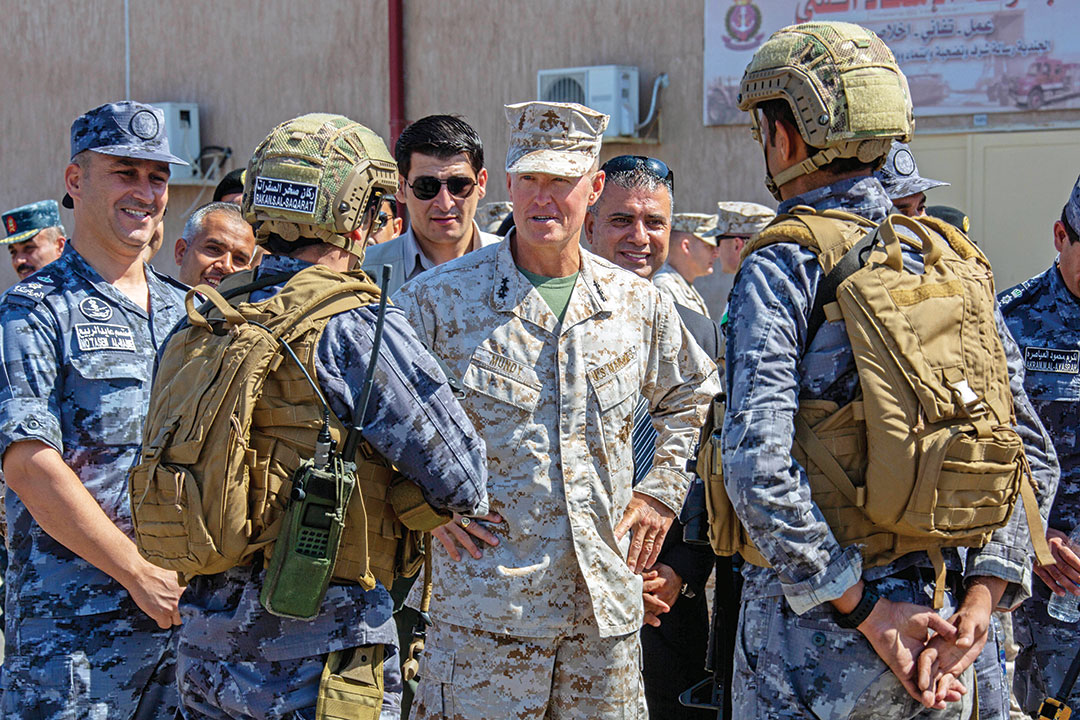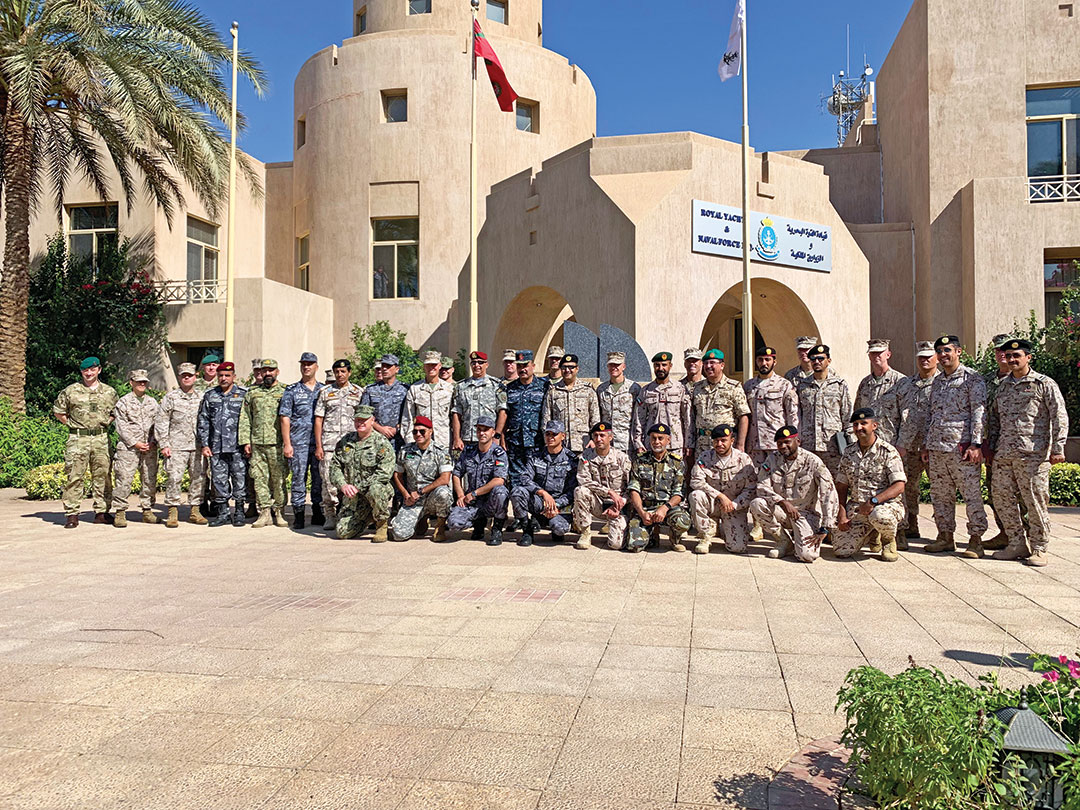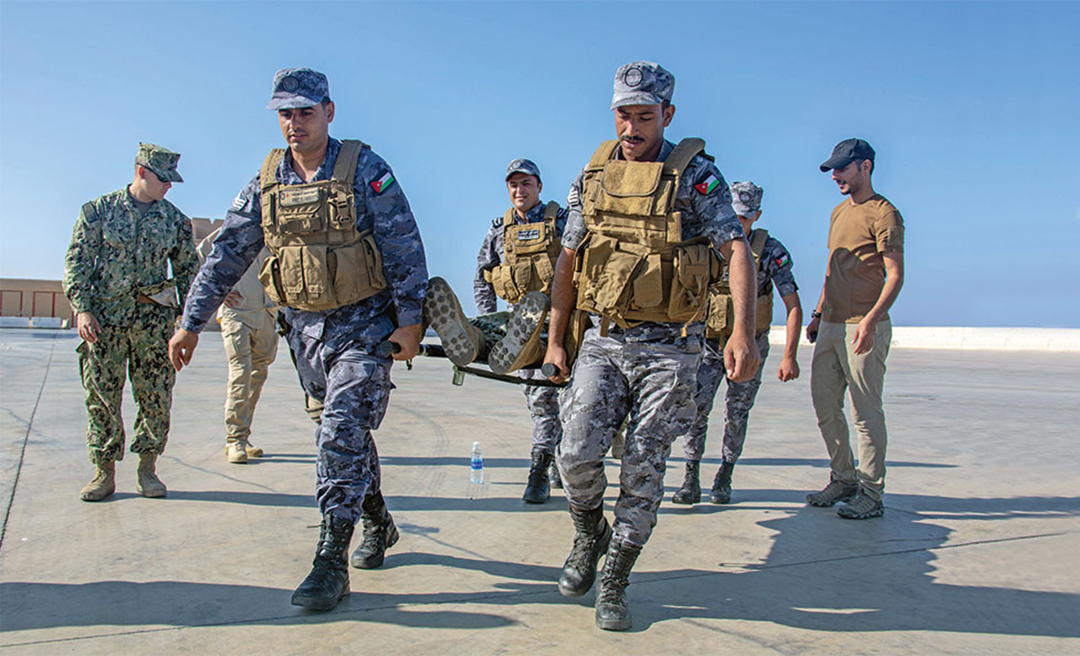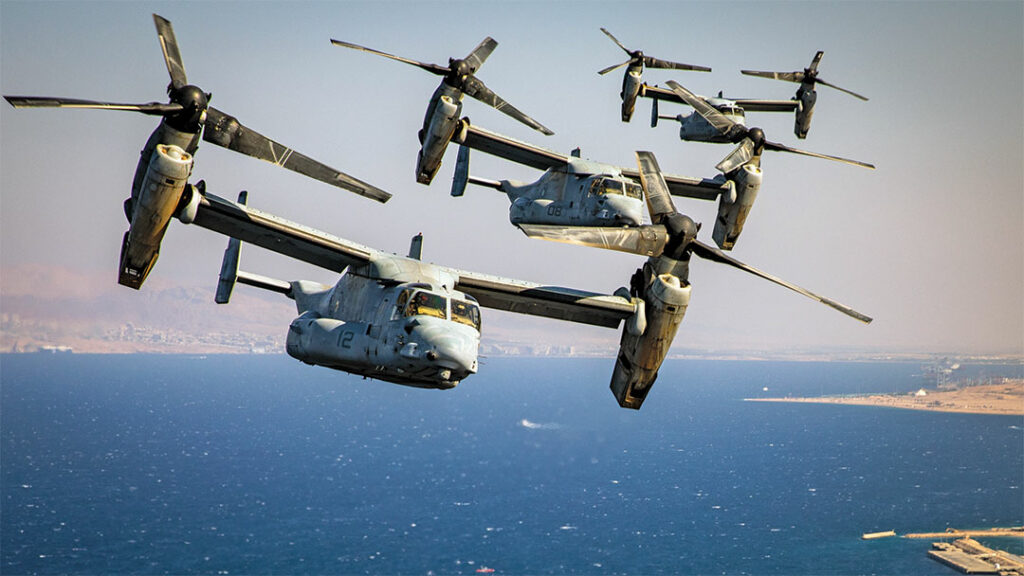Middle Eastern maritime forces support greater regional cooperation to defend critical infrastructure
UNIPATH STAFF
Shielded by the suppressing fire of patrol boats, a squad of Royal Jordanian Marines completed an amphibious landing, pressing their advantage in a blaze of machine guns and grenades. That was the signal for MV-22 Ospreys — their blades chopping the cloudless south Jordanian skies — to deploy U.S. Marines to reinforce the assault on Aqaba harbor.
Working impressively as one team on the land, in the air and from the sea, the Royal Jordanian and U.S. Marines demonstrated the advantages of maritime partnerships to leverage the relative strengths of regional forces. The drill was a fitting conclusion to the Middle East Amphibious Commanders Symposium (MEACS) held in September 2019 in Aqaba.
Eleven countries sent senior officers and enlisted personnel to discuss regional strategy at the symposium: countering terrorism, sharing intelligence, conducting exercises and establishing a quick reaction force to repel threats to coastal infrastructure. Attendees came from Bahrain, Egypt, Jordan, Kuwait, Lebanon, Oman, Qatar, Saudi Arabia, the United Arab Emirates, the United Kingdom and the United States.
Egyptian Navy Maj. Gen. Shareef Zakria emphasized teamwork to overcome challenges from terrorists and other criminals. He was gratified to hear Lt. Gen. Carl Mundy — commander of Marine Corps forces within U.S. Central Command — cite the Arabic saying fil itihad qawa — “strength in unity.”

“We have three vital chokepoints in our region. They are very critical to the global economy and our mission is to secure them,” Gen. Shareef said in reference to the Suez Canal, Bab el-Mandeb and the Strait of Hormuz. “We must work together to be stronger. The conflicts and instability in the neighboring countries impacts the security and stability in the entire region.
“In addition, the piracy and terror attacks that frequently target maritime and coastal infrastructure stretch over a large area beyond one nation’s ability to patrol. They required international efforts to suppress them.”
Royal Jordanian Navy Lt. Col. Hisham Aljarah noted that his country’s short coastline and shared maritime borders with Egypt and Saudi Arabia demand a cooperative approach. He expressed support for more intense cooperation, including the creation of a multinational Marine information-sharing center.
“Maritime terrorism and piracy have become a serious threat, so just like having a naval task force to protect the vital global resources, we must establish a marine task force or cell in the region to counter threats and speed information sharing among participating nations,” Lt. Col. Aljarah said.
The Royal Saudi Arabian Navy delegation echoed similar concerns about threats to regional and global stability. One delegate recounted how Saudi forces detected and destroyed two unmanned boats camouflaged as fishing vessels to blow up a Saudi port in September 2019.
“I would like to see more exercises in the Red Sea from the coast of Yemen to the Suez Canal,” the head of the Saudi delegation said. “Saudis led the Red Wave exercise in which many nations situated on the Red Sea participated.”
The proposal to create a regional information center for maritime forces also gained support from Brig. Gen. Ahmad Pisho Albelushi, commander of the United Arab Emirates’ Khalifa Bin Zayed Brigade.
“Intelligence information must be shared among friendly nations to disrupt unmanned aerial system attacks against ports, infrastructure and commercial ships,” he said. “UAS [unmanned aerial system] attacks can be stopped inside the area of responsibility during military operations because the military is equipped and trained against such attacks. However, attacking soft targets and infrastructures from unexpected directions is a challenge that can be overcome through shared intelligence among allies. Having a center to exchange information would lead to precise and successful missions.”

Brig. Gen. Mohammad Mustafa, commander of Lebanon’s Marine Commando Regiment, urged participants to research previous terrorist attacks for clues to future attacks. The need for maritime security has grown in Lebanon with the country’s decision to build a major oil terminal in the Mediterranean Sea.
“We must carefully inspect these attacks because the enemy focuses on his success to repeat it elsewhere,” Brig. Gen. Mustafa said. “They use cheap weapons system against very valuable targets.”
Information sharing is difficult even among government departments of a single nation, Brig. Gen. Mustafa said. So Marines must be aware of such pitfalls in establishing an international system. “The joint information cell must have liaisons from each nation that can rapidly communicate within their chain of command,” he said. “This is indeed the silver bullet to strike terror.”
Brig. Gen. Mubarak Rashid Alsuliti, commanding general of the Qatar Marines, briefed the symposium on the experiences of his units. Their mission is broad: Qatar protects 1,800 nautical miles of coastline and 240 oil and gas terminals. He voiced support for holding more multinational maritime exercises not just in the Red Sea, but also in the Arabian Gulf and Mediterranean Sea.
“We are always eager to learn new tactics and advance our experience,” the Qatari commander said. “We have basic and advanced training for our Marines in-country as well as send our personnel for further training to the United States and the United Kingdom.”

The Kuwait National Guard performs many of the functions of maritime troops in that country. Col. Fadhil Abas Ali described his mission: supporting the ministries of defense and interior to secure critical infrastructure like power generators, water desalination plants, government buildings and television and radio stations.
He expressed support for increased intelligence exchanges and smaller scale military exercises benefiting maritime units.
“I am very pleased to have this unique opportunity to participate in this symposium,” the colonel said. “I benefited a great deal at the personal and professional level. I am going back with fruitful recommendations to the National Guard.”
Brig. Gen. Jasim Alkubaisi, deputy commander of Bahrain’s Royal Guard, agreed with the idea of regional joint exercises on a smaller scale.
“I agree with Jordan to establish a small joint Marine and Navy exercise in the Red and Mediterranean seas and Arabian Gulf which will return great benefits for all of us and prepare us to conduct joint operations in the different parts of the region and adopt to its terrain and climate,” Brig. Gen. Jasim said.
Maj. Nayef Alkhalifa, a Royal Bahrain Marine officer, agreed with his colleague.
“We have a long-term partnership with the United States that we are both committed to,” he said. “Bahrain and Saudi Arabia have a deeply rooted historic relationship. We have a bilateral exercise with the U.K. — Pearl Dagger — that consists of infantry and amphibious training between the Bahrain Defense Force and U.K. Royal Marines.”

Participants at the 2019 MEACS left full of ideas for improving the effectiveness of regional maritime forces. Some takeaways included assembling a regionally based quick reaction force, an information sharing center and marines operations center.
Gen. Salim Almezini, director of the Sultan Qaboos Naval Academy, expressed his appreciation for the invitation.
“It is great to be among friends and allies to discuss regional common challenges,” the general said. “We should learn about the actions and equipment that enable us to defeat unmanned aerial system attacks before they strike, because these attacks cause huge damage to the regional and global economy.”
Representing the host nation of Jordan, Lt. Col. Mutasim Alrabia, Royal Jordanian Marines commander, continues to upgrade his force with the intent of accomplishing missions at home and abroad.
“We must train and be in highest state of readiness to defeat the terrorist threats or reduce their impact,” he said.

